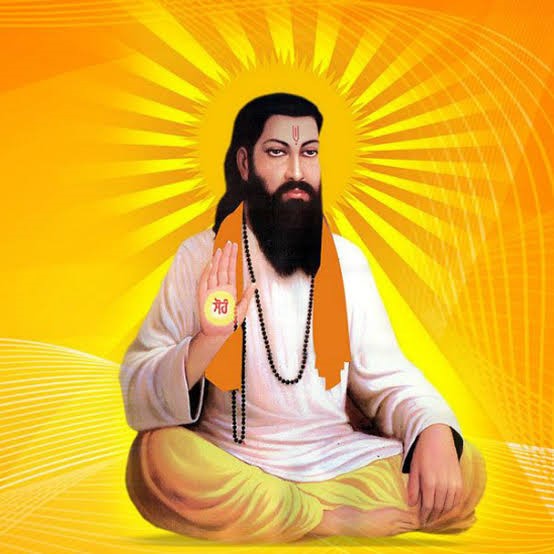Description

Disclaimer: Copyright infringement not intended.
Context: The President of India, Smt. Droupadi Murmu has greeted fellow-citizens on the eve of birthday of Sant Guru Ravidas.
Details:
Sant Ravidas:
- Ravidas was an Indian mystic poet-saint of the Bhakti movement during the 15th to 16th century CE.
- Venerated as a guru (teacher) in the modern regions of Uttar Pradesh, Bihar, Rajasthan, Gujarat, Maharashtra, Madhya Pradesh, Punjab, and Haryana, he was a poet, social reformer and spiritual figure.
- Scholars believe he was born in 1450 CE.
- He taught removal of social divisions of caste and gender, and promoted unity in the pursuit of personal spiritual freedom.
- Ravidas's devotional verses were included in the Sikh scriptures known as Guru Granth Sahib.
- The Panch Vani text of the Dadu Panthi tradition within Hinduism also includes numerous poems of Ravidas.
- He is also the central figure within the Ravidassia religious movement.
.jpeg)
Literary works:
- The Adi Granth and the Panchvani of the Hindu warrior-ascetic group Dadupanthi are the two oldest attested sources of the literary works of Ravidas.
- In the Adi Granth, forty one of Ravidas's poems are included, and he is one of thirty six contributors to this foremost canonical scripture of Sikhism.
Philosophy:
- The songs of Ravidas discuss Nirguna-Saguna themes, as well as ideas that are at the foundation of Nath Yoga philosophy of Hinduism.
- He frequently mentions the term Sahaj, a mystical state where there is a union of the truths of the many and the one.
- Ravidas's poetry is imbued with themes of boundless loving devotion to God, wherein this divine is envisioned as Nirguna.
- In the Sikh tradition, the themes of Nanak's poetry are very broadly similar to the Nirgun bhakti ideas of Ravidas and other leading north Indian saint-poets.
Monistic Brahman or Anthropomorphic God:
- Multiple manuscripts found in Rajasthan and Uttar Pradesh, dated to be from the 18th and 19th centuries, contain a theosophical debate between Kabir and Ravidas on the nature of the Absolute, more specifically whether the Brahman (Ultimate Reality, Eternal Truth) is monistic Oneness or a separate anthropomorphic incarnate.
- Kabir argues for the former. Ravidas, in contrast, argues from the latter premise to the effect that both are one.
- In these manuscripts, Kabir initially prevails, Ravidas accepts that Brahman is monistic, but till the end Kabir didn't accept worshipping a divine avatar (sagun conception).

PRELIMS QUESTION:
Q.Consider the following statements in reference to Sant Ravidas:
- He is the central figure within the Ravidassia religious movement.
- The Adi Granth and the Panchvani are the two oldest attested sources of the literary works of Ravidas.
Which of the above is/are correct?
a.1 only
b.2 only
c.Both 1 and 2
d.Neither 1 nor 2
Correct answer: c

https://www.pib.gov.in/PressReleasePage.aspx?PRID=1896349
















